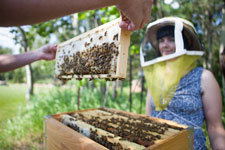Efforts to change Edmonton’s bylaws to allow for urban beekeeping have turned into a sweet success story for a NAIT instructor.
Jocelyn Crocker, a Biological Sciences Technology instructor and licenced beekeeper, is able to produce honey in her Edmonton backyard after years of making her case to city hall. For her, the milestone is another step toward a bigger beekeeping community in Edmonton, along with its ecological benefits.
Crocker and her husband Michael Hamilton were among a small group of bee lovers who formed YEG Bees in early 2014 to lobby for changes to Edmonton’s bylaws. They wanted allowances for backyard beekeeping, like those in Calgary and Vancouver.
The group established 4 hives in rural Strathcona County, 2 of which they moved to Crocker and Hamilton’s southwest Edmonton home – along with tens of thousands of bees they contained – after the city approved it as the site for the pilot beekeeping project in August 2014. Since then, Edmonton council has passed a bylaw amendment to allow beekeeping in the city.
 Honey from across the city
Honey from across the city
This fall, Crocker formed a honey co-op earlier with 8 other beekeeping colleagues, 2 of them fellow NAIT staff: Culinary Arts instructor David Whitaker (Cooking '82) and Leanne Floden, a NAIT Business Administration instructor. An early spring got the bees buzzing early, producing more honey than expected. It allowed them to start selling honey at weekend farmers’ markets.
“That is why we decided to form a co-op,” says Crocker. “We want to offer people the opportunity to buy honey from different neighbourhoods in the city.”
The group has sold honey at the Callingwood Farmers’ Market in west Edmonton every Wednesday and in the French Quarter Grand Market near Edmonton’s Old Strathcona district every Sunday for the rest of September.Jars of honey sold by the co-op range from 250 to 750 grams and cost $6 to $15.
 Changing attitudes
Changing attitudes
“This movement is more about sharing rather than making a profit,” said Crocker.
It’s also about continuing the effort to raise awareness about the value of urban beekeeping. Since the bylaw was amended, Crocker has seen perceptions change as well. Communities of beekeepers have started up in Edmonton that are great places for newbies to learn about the practice.
Attitudes among nearby neighbours are also shifting, says Crocker. Homeowners are understanding the importance of bees to the local food supply. “Bees are so crucial,” she says. “One-third of every bite of food we eat requires pollination.”
So far, the project has been so successful that those who have a hankering for honey from the co-op they will have to wait until next year, says Crocker. The group only had enough product for the farmers’ markets. (Crocker even had to politely tell honey-craving co-workers to buzz off as her honey supply was so limited.)
“If you wanted a taste of your neighbourhood then you need to come to the market,” she said.
How to help Edmonton's bee population
-
Avoid using pesticides in your garden and green-spaces, says urban beekeeper Jocelyn Cocker.
- Don’t panic when you or your when your child sees a bee. Crocker says bees are docile and generally don’t sting people, mostly because once they sting, they die.
- Grow bee-friendly plants. Growing herbs from an apartment patio can help bees.
- Weeds can be a good thing for bees, particularly pollen-filled dandelions and clover.